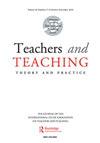Perceived relatedness-support matters most for teacher well-being: a self-determination theory perspective
IF 1.9
2区 教育学
Q2 EDUCATION & EDUCATIONAL RESEARCH
引用次数: 1
Abstract
ABSTRACTThis study investigated whether teachers’ perceptions of school leaders’ need-supportive practices were associated with teacher well-being using variable- and person-centred approaches. Self-determination theory was used as the theoretical lens. A sample of 611 high school teachers nested in 14 schools participated in this study. We first examined whether need-supportive leadership practices (i.e. support for autonomy, competence, and relatedness) were associated with well-being and ill-being via autonomous motivation. Results revealed that relatedness-support was positively associated with well-being and negatively associated with ill-being. However, autonomy and competence-support were not significant predictors. Next, we identified the existence of different subgroups of teachers based on their perceived need-supportive leadership using a person-centred approach. Results indicated four distinct subgroups: dissatisfied, ambivalent, average, and thriving teachers. Dissatisfied teachers have very low perceived need-support and scored particularly low in competence- and relatedness-support. Ambivalent teachers reported especially low relatedness-support. Average teachers reported average levels of need-support with scores close to the group average. Lastly, thriving teachers indicated the highest levels of perceived need-support. Each subgroup showed distinct motivation and well-being profiles. Overall, the variable and person-centred approaches provided converging evidence showing the importance of perceived need-supportive leadership for teachers’ motivation and well-being. Theoretical and practical implications were discussed.KEYWORDS: SDTperceived need-supportive school leadershipvariable and person-centred approachautonomous motivationteacher well-being Disclosure statementNo potential conflict of interest was reported by the author(s).Supplementary materialSupplemental data for this article can be accessed online at https://doi.org/10.1080/13540602.2023.2263736Additional informationFundingThis research did not receive any specific grant from funding agencies in the public, commercial, or not-for-profit sectors.感知关系支持对教师幸福感影响最大:自我决定理论视角
摘要本研究采用变量中心和以人为本的方法,调查了教师对学校领导需求支持实践的看法是否与教师幸福感相关。以自我决定理论为理论视角。本研究以14所学校的611名高中教师为样本。我们首先考察了需求支持型领导实践(即对自主性、能力和相关性的支持)是否通过自主动机与幸福感和不幸福感相关联。结果显示,亲属支持与幸福感呈正相关,与不幸福感呈负相关。然而,自主性和能力支持不是显著的预测因子。接下来,我们使用以人为本的方法,根据他们感知到的需求支持型领导,确定了不同教师小组的存在。结果显示了四个不同的亚组:不满意的,矛盾的,一般的,和蓬勃发展的教师。不满意的教师有非常低的感知需求支持和得分特别低的能力和关系支持。矛盾的教师报告的亲缘关系支持尤其低。普通教师报告的需求支持的平均水平与小组平均水平接近。最后,茁壮成长的教师表现出最高水平的感知需求支持。每个亚组都表现出不同的动机和幸福感。总体而言,变量和以人为本的方法提供了趋同的证据,表明感知到的需求支持型领导对教师的动机和福祉的重要性。讨论了理论和实践意义。关键词:sdt感知需求支持型学校领导变量和以人为本的方法自主动机教师幸福感披露声明作者未报告潜在的利益冲突。补充材料本文的补充数据可在https://doi.org/10.1080/13540602.2023.2263736Additional上获取。本研究没有从公共、商业或非营利部门的资助机构获得任何特定的资助。
本文章由计算机程序翻译,如有差异,请以英文原文为准。
求助全文
约1分钟内获得全文
求助全文
来源期刊

Teachers and Teaching
EDUCATION & EDUCATIONAL RESEARCH-
CiteScore
4.20
自引率
7.40%
发文量
71
期刊介绍:
Teachers and Teaching: theory and practice provides an international focal point for the publication of research on teachers and teaching, in particular on teacher thinking. It offers a means of communication and dissemination of completed research and research in progress, whilst also providing a forum for debate between researchers. This unique journal draws together qualitative and quantitative research from different countries and cultures which focus on the social, political and historical contexts of teaching as work. It includes theoretical reflections on the connections between theory and practice in teachers" work and other research of professional interest.
 求助内容:
求助内容: 应助结果提醒方式:
应助结果提醒方式:


